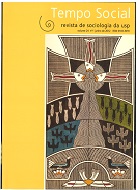Max Weber and the cultural history of modernity
DOI:
https://doi.org/10.1590/S0103-20702012000100007Keywords:
Max Weber, Max Weber Gesamtausgabe, Cultural history, Intellectual history, Sociology of the StateAbstract
This article takes a new look at Weber as a historian. The MWG's detailed reconstruction of the scientific and intellectual historical context provides a clear insight into how all the different topics on which Weber worked - the capitalist market economy, world religions, or the modern state - were ultimately treated "from the view-point of cultural history." In response the article examines four aspects: Economic history; or more precisely, the cultural meaning of economic action as a key to Weber's historical thinking as a whole (I); Weber's insistence on the primacy of analytical problems and of choices of perspectives as intellectual presuppositions of historical knowledge (II); the cardinal question of cultural history in general: how ideas take effect in historical constellations and conflicts, and how the peculiarity of European cultural development is to be described in its universal-historical significance (III); the relevance of the First World War for Weber's problems and perspectives: his concentration on a historical-political theory of power and domination and of the genesis and structure of the modern state and democracy (IV).Downloads
Download data is not yet available.
Downloads
Published
2012-01-01
Issue
Section
Dossier - Max Weber
License
Copyright (c) 2015 Tempo Social

This work is licensed under a Creative Commons Attribution-NonCommercial 4.0 International License.
How to Cite
Hübinger, G. (2012). Max Weber and the cultural history of modernity. Tempo Social, 24(1), 119-136. https://doi.org/10.1590/S0103-20702012000100007


